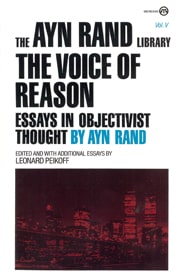

The Voice of Reason: Essays in Objectivist Thought is a posthumous collection of Rand’s works edited by Rand’s heir and long-time student and associate, Leonard Peikoff, who says the book is “the final collection of Ayn Rand’s articles and speeches that I plan to publish. It may be regarded as the best of the non-anthologized Ayn Rand.”
The essays in The Voice of Reason cover the span of Rand’s thought: from theoretical philosophy to cultural and political commentary, from a discussion in “Who Is the Final Authority in Ethics?” of why God or any other alleged authority is incompatible with the science of morality to a discussion in “Through Your Most Grievous Fault” of the death of Marilyn Monroe.
In addition, the book contains articles by Peikoff as well as an essay by Objectivist scholar Peter Schwartz.
— Leonard Peikoff, “Introduction,” The Voice of Reason
Between 1961, when she gave her first talk at Ford Hall Forum in Boston, and 1981, when she gave the last talk of her life in New Orleans, Ayn Rand spoke and wrote about topics as different as education, medicine, Vietnam and the papal encyclical Humanae Vitae (Of Human Life).
The Voice of Reason is a collection of these pieces gathered in book form for the first time. Here we get some of Rand’s most in-depth treatments of issues such as religion, sex, abortion, foreign policy and the mixed economy.
With Rand’s selections are five essays by philosopher Leonard Peikoff, Rand’s longtime associate and literary executor, covering such topics as education and socialized medicine, as well as a piece by Objectivist scholar Peter Schwartz on the difference between libertarianism and Objectivism.
The work concludes with Peikoff’s epilogue, “My Thirty Years with Ayn Rand: An Intellectual Memoir,” which answers the question “What was Ayn Rand really like?”
“Where — in today’s culture — can a man find any values or any meaningful pleasure? . . .
“A chronic lack of pleasure, of any enjoyable, rewarding or stimulating experiences, produces a slow, gradual, day-by-day erosion of man’s emotional vitality, which he may ignore or repress, but which is recorded by the relentless computer of his subconscious mechanism that registers an ebbing flow, then a trickle, then a few last drops of fuel — until the day when his inner motor stops and he wonders desperately why he has no desire to go on, unable to find any definable cause of his hopeless, chronic sense of exhaustion.
“Yes, there are a few giants of spiritual self-sufficiency who can withstand even this. But this is too much to ask or to expect of most people, who are unable to generate and to maintain their own emotional fuel — their love of life — in the midst of a dead planet or a dead culture.” — Ayn Rand, “Our Cultural Value-Deprivation,” The Voice of Reason
Ayn Rand was once asked if she could summarize the essence of her philosophy while standing on one foot. She replied: “Metaphysics: Objective Reality. Epistemology: Reason. Ethics: Self-interest. Politics: Capitalism.”
In the first entry in this collection, Rand expands on this encapsulation. “If you want this translated into simple language, it would read: 1. ‘Nature, to be commanded, must be obeyed’ or ‘Wishing won’t make it so.’ 2. ‘You can’t eat your cake and have it, too.’ 3. ‘Man is an end in himself.’ 4. ‘Give me liberty or give me death.’
“If you held these concepts with total consistency, as the base of your convictions, you would have a full philosophical system to guide the course of your life. But to hold them with total consistency — to understand, to define, to prove, and to apply them — requires volumes of thought. Which is why philosophy cannot be discussed while standing on one foot. . . .”
Ayn Rand is a defender of reason, and thus an opponent of religion and its embrace of faith. Throughout the essays in this book, both Rand and her associate Leonard Peikoff analyze this gulf from a variety of perspectives.
In “Religion Versus America,” Peikoff argues that the principles at the foundation of America are incompatible with the essence of religion. “There are many good people in the world who accept religion,” he concludes, “and many of them hold some good ideas on social questions. I do not dispute that. But their religion is not the solution to our problem; it is the problem.”
Rand touches on these and many other aspects throughout the book, contrasting her philosophy to religion on an array of topics, including sex, abortion, art and ethics. In “Who Is the Final Authority in Ethics?,” for instance, she explains why any appeal to authority is fundamentally incompatible with morality.
Rand argues that we are radically mistaken about the nature of altruism. Rather than being a synonym for kindness or benevolence, altruism (which literally means “other-ism”) is the doctrine that the individual has no right to live for his own happiness, that service to others is the only moral justification for his existence. To declare to an individual “your life doesn’t count!” is the opposite of goodwill.
Rand often observes that altruism is accepted without argument. In a fascinating article, “Altruism as Appeasement,” Rand explores one reason why so many intellectuals, whose very profession is to formulate logical arguments, nevertheless support and advocate altruism despite its lack of arguments. She contends there is a form of spiritual appeasement at work: “an intellectual appeaser surrenders morality, the realm of values, in order to be permitted to use his mind.” The consequence of this appeasement is disastrous: to abandon the entire field of morality to evil.
Throughout this collection and indeed across all of her works, Rand often credits Aristotle as her one great philosophic debt. In her book review of John Herman Randall’s Aristotle, Rand gives her most in-depth assessment of this great Greek philosopher.
“There is only one fundamental issue in philosophy: the cognitive efficacy of man’s mind. The conflict of Aristotle versus Plato is the conflict of reason versus mysticism. It was Plato who formulated most of philosophy’s basic questions — and doubts. It was Aristotle who laid the foundation for most of the answers.”
By defending the efficacy of man’s mind, Rand argues, Aristotle is responsible for the great achievements of Western civilization. “Aristotle may be regarded as the cultural barometer of Western history. Whenever his influence dominated the scene, it paved the way for one of history’s brilliant eras; whenever it fell, so did mankind.”
What was Ayn Rand really like? In the epilogue to The Voice of Reason, Rand’s longtime student and associate, Leonard Peikoff, gives his answer. “My Thirty Years with Ayn Rand” focuses, not on the details of Rand’s biography, but on the way she used her mind, which Peikoff calls “the root of her uniqueness.”
“The mental processes she used in everyday life, from adolescence on, were the processes that led her, one step at a time, to all of her brilliant insights and to the principles of Objectivism.”
After describing Rand’s method of thinking, Peikoff ends with some moving observations about Rand the person. “Because of the power of her mind and the purity of her soul,” Peikoff concludes, “she gave me, when I was with her, what her novels give me: a sense of life as exaltation, the sense of living in a clean, uplifted, benevolent world, in which the good has every chance of winning, and the evil does not have to be taken seriously.”